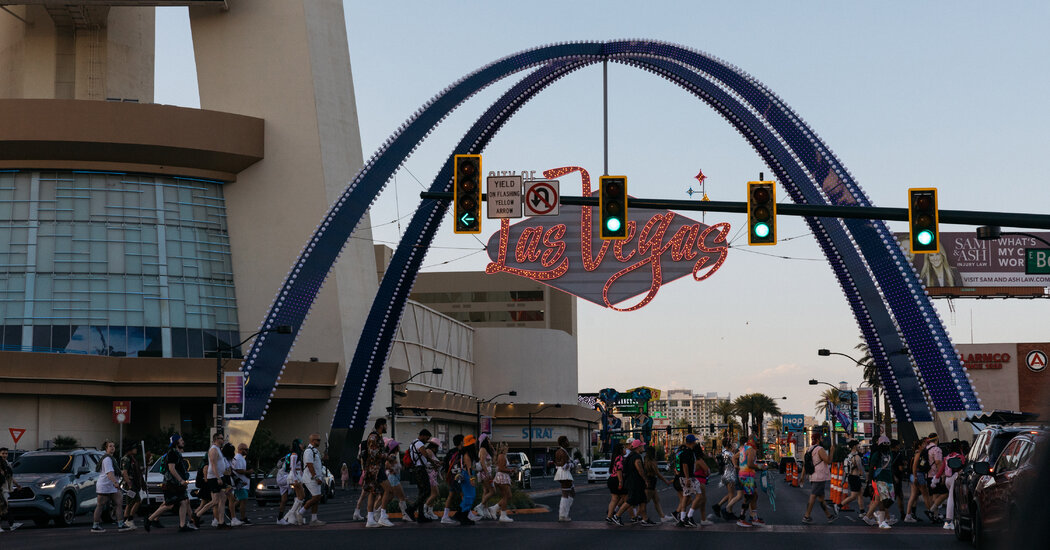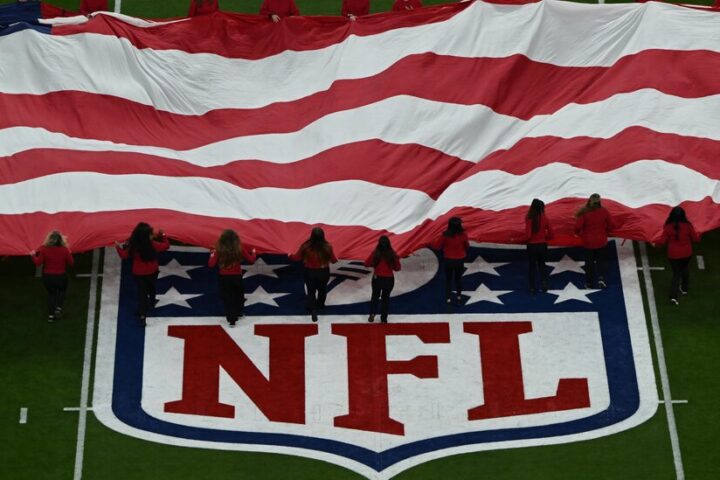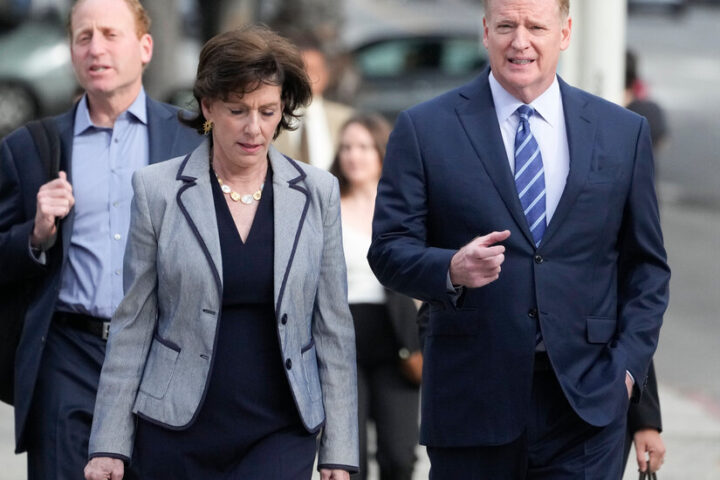O.J. Simpson, even in his final years, was somewhat of a spectacle.
In his presence, heads turned and whispers swirled. There was no story about him without that white Ford Bronco, the bloody gloves, the two chilling murders.
When he settled in Las Vegas seven years ago, it seemed fitting that he would choose a city of escape and second acts. Here, he became a man about town, known for pulling up to a steakhouse in a Bentley convertible, appearing at lavish parties and posing for selfies.
His lifestyle was comfortable — and far too pleasant to those who believed he deserved to spend his remaining days in prison.
But there was one element that made him feel accepted in Las Vegas. A little-known golf crew called In the Cup.
Its 40 or so members are neither wealthy nor powerful. They play at public courses, not lush country clubs. They are military veterans, retired police officers, small business owners, airport security workers.
Most are Black. And none of them cared about Mr. Simpson’s past.
“It’s not something we talked about, not something we discussed, not something we went into. We left it alone,” said one member, Leroy Wordlaw, 72, a retired Marine master sergeant. “This is a man who came to us the way he is.”
Mr. Simpson had spent his prime years in a rich, white world that was far from his roots in the San Francisco housing projects. At the height of his fame, he lived in a Tudor-style estate in Brentwood, an affluent Los Angeles enclave, and owned an oceanfront home on the sands of Laguna Beach.
During that time, he was revered for his success on the football field and in Hollywood. But he was also criticized by some Black Americans for sequestering himself from them.
Decades later, his reputation tarnished, it would be golf, a sport steeped in whiteness and privilege, that tethered him to a group of Black friends in Las Vegas. He often described his plans with In the Cup as “hanging with the brothers.”
“He said, ‘This is just what I needed, this club,’” his friend, Trimain Dunn, 58, recalled. “People who he could relate to, no judgment.”
It was this social circle that became an unlikely pillar in the coda to Mr. Simpson’s strange trajectory until his death in April at 76.
‘That quiet murmur’
When Mr. Simpson was acquitted of murder in 1995, a majority of Americans believed the killer had just been set free. His trial had marched out horrific details: his history of spousal abuse and the way the victims — his former wife, Nicole Brown Simpson, and her friend, Ronald L. Goldman — had been so viciously stabbed.
His talent and management agency quickly distanced itself from him. A sign declaring “Home of the Brentwood butcher” was posted not far from his house. Neighbors made it clear that he was persona non grata.
“Where do they want me to go? To Africa? Is that what some of those people would want? Go where?” Mr. Simpson said in an interview with Black Entertainment Television in 1996.
He became even more of a pariah when, in 2007, he and a group of men broke into a Las Vegas hotel room in search of what he said were his personal mementos. He was convicted of armed robbery and kidnapping and sent to a rural prison in Nevada.
When granted parole in 2017, Mr. Simpson returned to a city that seemed uninterested in condemnation.
He lived for a few months in a five-bedroom house owned by his friend James Barnett, a tech entrepreneur. Although he appeared on the Strip occasionally, Mr. Simpson preferred to stick to downtown Summerlin, a planned community full of wealthy retirees about 14 miles west in the Las Vegas Valley.
He became a fixture at Jing, a steak and seafood restaurant lined in neon, as well as at Grape Street, a cafe and wine bar. He would drop by Vintner Grill, an upscale bistro, to listen to live jazz and go to Minor League Baseball games.
Living off Social Security and pensions from the N.F.L. and the actors’ guild, he eventually moved into a gated community and shared a home with his oldest daughter, Arnelle, while his son Justin lived up the street. He doted on grandchildren, played fantasy football, had girlfriends and moved around easily in public.
In an odd way, his prison time had helped soften perspectives. Some saw his Nevada sentence as a proxy for the punishment he avoided in the murder trial. Others offered apologies, believing that the nine years he served for the crime in Las Vegas was too harsh. Requests for autographs and selfies were constant.
Mr. Simpson enjoying any sort of adulation was a startling notion to those who closely followed his saga and were convinced he was a brutal killer. But for the younger generation, Mr. Simpson was notorious in name only — a relic from their parents’ time.
“It would be kind of rude of me to treat him a different way for something that happened that I wasn’t even around for,” said Christian Cox, 22, a valet who noted that Mr. Simpson left generous tips.
On rare occasion, someone would call out, “Murderer!” Others were polite, but not always warm. Caustic comments were made out of earshot.
“It was just kind of that quiet murmur on the side,” explained Alyssa Ivanoff, 29, a server at Jing who waited on Mr. Simpson.
But when admirers approached him — and they often did — he engaged them with charm. It did not matter whether that person was a fan, bewitched by celebrity or looking for a brush with infamy.
He reveled in the attention, said Malcolm LaVergne, a Las Vegas attorney who represented Mr. Simpson at his parole hearing and is now the executor of his will.
“The biggest punishment you could have ever given O.J., that the whole world could have given O.J.,” Mr. LaVergne said, “is to just pretend he was a regular person.”
‘I can’t believe O.J.’s playing golf with us’
Mr. Simpson found his way to In the Cup in fall 2018.
He was invited by a member he had encountered at a cigar bar. After a few nudges, Mr. Simpson finally showed up to play. Then he kept coming back.
Members were star-struck in the beginning. They had grown up idolizing him as an athlete, and now he was here talking trash, laughing, trying to distract them as they teed off.
“At first it was like everybody in this club was just absolutely enamored with him, like, ‘I can’t believe O.J.’s playing golf with us,’” said Mr. Dunn, who retired from the U.S. Navy and works part-time in security at Allegiant Stadium.
When things relaxed, they never let Mr. Simpson forget that on his first day he shot over 100, a miserable score.
“We started calling him Kool-Aid, because, hey, you ain’t Juice until you break 90,” Mr. Dunn said, referring to Mr. Simpson’s football nickname.
The club had formed with a handful of golfers in 2013 as a way to be officially recognized by the United States Golf Association and to play more competitively.
Still, a crowd of Black men on a fairway tended to attract scrutiny. Golf course marshals hounded them to hurry along and to quiet their voices. Once, a member seeking shade under a tree was accused of urinating. The group learned quickly which courses did not deserve their money.
Paying $125 a year in dues, they hopped between venues and especially enjoyed Chimera Golf Club in nearby Henderson, which offered a view of the mountains and the Strip. They liked to play for a small pot of cash that they divvied up in the clubhouse afterward. Sometimes there were themes, such as jersey day or knickers day.
The club hosted semiannual tournaments, raised money for nonprofits and held Christmas parties, where members brought a potluck dish and a Secret Santa gift. Mr. Simpson was an eager participant in all of it, wearing his Buffalo Bills jersey when requested, even winning a couple tournaments and getting his name engraved on a trophy.
Members took glee in ribbing him about his football career. “We would say, ‘Who was the best running back that played for the Bills?’ Somebody else would answer, ‘Thurman Thomas!’” said Isadore Breaux, 71. “Of course he would laugh or act like he was throwing something at you.”
Autograph and photo seekers managed to track down Mr. Simpson every time, camping out on the fairways or in the clubhouse.
“Everybody felt I guess a little taller,” said Mr. Breaux, a retired poker dealer. “He made the club shine a little — his presence, his personality.”
Overlooking his past
Mr. Simpson had once experienced golf through the prism of luxury and elitism.
In 1992, he became the first Black member of the exclusive Arcola Country Club in Paramus, N.J. His membership was sponsored by Frank Olson, a top executive of Hertz, the car rental company that featured him in commercials.
At the time, he was also a member of Riviera Country Club, a favorite of Hollywood A-listers in Los Angeles that comes with a six-figure initiation fee. And he was a frequent celebrity guest at pro-ams and charity tournaments around the country.
Golf would be an unusual thread throughout Mr. Simpson’s life, coming up numerous times in his murder case. He had played at Riviera with friends the morning of June 12, 1994. The killings took place that night when Mr. Simpson said he was at home chipping golf balls. He was scheduled to play in the Chicago area the following day with corporate clients of Hertz.
The murder trial soon transfixed the world, and opinions were divided by race. It came after the Los Angeles police officers who beat Rodney King, a Black motorist, were acquitted. The jury decision in Mr. Simpson’s favor was seen as a rare moment of justice for many Black Americans in an unfair nation.
Afterward, however, Mr. Simpson’s pastime became, in the eyes of critics, audacious and distasteful. He had asked for a leave from Arcola, and Riviera members bristled at the idea of him returning, so he was resigned to the more affordable public courses. Detractors were quick to ask how he was searching for the real killer as promised, while on the back nine.
“People who murder belong on death row, not a golf course,” Mr. Goldman’s father, Fred, told People magazine in 1999.
More than two decades later, Mr. Simpson would find himself ensconced in a golf group where he needed no sponsor, no clout, no explanation.
For members of In the Cup, it was not an issue whether Mr. Simpson “did it.” He was found not guilty. He had also ultimately served time in prison. That was enough.
“Everybody’s got a past,” said Rontu Elam, 45, a rap artist who joined four years ago. “I don’t think it’s something that’s really looked at around here. And it’s never been an issue with me or anybody else.” Mr. Elam himself was previously accused of murder and sex trafficking in two different Las Vegas cases. Both fell apart when prosecutors could not get witnesses to testify, according to The Las Vegas Review-Journal, and the charges were dismissed.
Mr. Simpson last played with In the Cup in January, although he visited a few weeks before his death. Prostate cancer had stolen his strength, and he walked with a cane, but he was spirited.
There was a sense that he would push through. Now they keep black armbands in his honor. The club, some said, was bound to lose much of its verve.
Undeserved comfort for Simpson?
This image of Mr. Simpson — venerated as an icon, accepted without scrutiny, mourned with deep respect — can be difficult for some to take in. Did he deserve to live his last chapter so freely, laughing on the putting green and over drinks with friends? Many would say no.
Ms. Brown Simpson’s sisters declined to be interviewed for this article, while Fred Goldman did not respond to requests for comment. Mr. Simpson avoided paying the family members most of the wrongful death judgment ordered by a civil court after a jury found him responsible for the murders.
Mr. Simpson’s world remains pondered and written about even after his death, with reports this past week that the F.B.I. released documents related to his trial. But there are plenty who feel that the spotlight he loved should shine elsewhere.
A Lifetime documentary series recently aired focusing on Ms. Brown Simpson and featuring her friends and family.
In the first episode, her younger sister, Dominique Brown, says that, maybe after 30 years, “it’s time to rekindle the flame of Nicole.”




